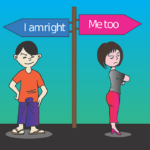
One of the most important traits of emotionally intelligent people is their ability to look at the world from different perspectives.
They don’t get wrapped up in their own emotions and they can understand how other people are feeling. This allows them to use psychological tricks to change their perspective and see things in a new light.
One way that emotionally intelligent people change their perspective is by using reframing. This is when you take the same situation and view it in a different light.
For example, if you get rejected from a job, you could view it as a sign that you’re not meant to do that job or as an opportunity to find a better job.
Similarly, if you fail a test, you could view it as an opportunity to study for the next test or as a sign that maybe college isn’t for you.
Reframing can be beneficial because it helps you see that things aren’t always what they seem.
In doing so, it enables you to see new opportunities and to stay positive even in the face of adversity.
Changing your glasses
Emotionally intelligent people use psychological tricks to change their perspectives.
If you’re not wearing glasses, then this metaphor might sound a bit odd (and you might be wondering where I’m going with this).
However, if you are familiar with it, then you know what I mean.
The idea of changing your glasses is based on the idea that we see the world through our own filters. These filters are created by our beliefs, experiences, and emotions.
When we look at the world through our glasses, we see things in a certain way. However, if we change our glasses, then we can see the same situation in a different light.
For example, if you believe that all dogs are friendly, then you’re going to see dogs as being friendly. This is because your belief will shape how you view the world.
However, if you start believing that all dogs are mean and out to attack, then this will change your glasses and allow you to see things differently.
This metaphor also applies to emotionally intelligent people because they know that the world is often not as it seems.
While most of us filter our opinions through the glasses we wear, emotionally intelligent people choose to change their perspectives by changing their glasses.
They do this by taking a step back and looking at things from a different perspective so that they can see beyond what’s in front of them.
Cognitive distancing
Another way that emotionally intelligent people change their perspective is by using cognitive distancing. This is when you distance yourself from your thoughts and feelings.
For example, if you’re feeling angry, you might try to imagine what someone else would think about the situation. This can help you see the situation from a different perspective and it can help you stay calm.
Similarly, if you’re feeling sad, you might try to imagine what someone else would feel in the same situation.
This can help you see the situation from their perspective and it can make you feel more understanding.
Cognitive distancing is beneficial because it allows us to take a step back and to see things from an objective perspective.
When you distance yourself like this, it allows you to better understand your emotions and the way that other people feel. This can help you to empathize with them and it can enable you to act in ways that are more helpful.
Emotionally intelligent people ask questions

Another way that emotionally intelligent people change their perspectives is by asking questions.
Questions are the key to transforming your relationships, managing your moods, and achieving your goals.
Asking yourself (and others) effective questions can help you find out what you’re thinking and feeling, and it can help you to figure out the best course of action.
When it comes to changing your perspective, there are two types of questions that you should ask yourself:
- Open-ended and closed-ended questions. Open-ended questions allow you to explore your thoughts and feelings.
- Closed-ended questions allow you to come up with a solution.
Here are a few examples of each type of question:
Open-ended questions
- What are you feeling right now?
- Why do you think that’s the case?
- How do you think things could be different?
Closed-ended questions
- What should I do about this situation?
- Do you think this is a good idea?
- Is there another way to look at this?
Emotionally intelligent people know that the world is often not as it seems, and they change their perspectives by changing their glasses.
They do this by taking a step back and looking at things from a different perspective so that they can see beyond what’s in front of them.
They also use cognitive distancing by taking a step back and looking at things from an objective perspective.
And, finally, they ask the right questions to help them figure out what they’re thinking and feeling which can help them change their lenses.
- Related post: Simplest mental hacks that may be done on a daily basis
- Related post: How Common Life Events Can Lead to Emotional Crises
How to get your emotions under control
The best way to change your perspective is to practice. You can start by trying out some of the strategies that are explained above, and then you can experiment with others.
Eventually, this will become second nature. Just remember that there are lots of effective ways to change your perspective, so you should try different tactics such as :
Start writing
Putting your feelings down on paper, rather than just typing them, can be a powerful tool for forcing yourself to think about your emotions.
Ben may believe he is truly unlucky and that there’s no way he’ll get another job.
However, merely putting his thoughts down on paper may help him take stock of his current situation and the truth of those sentiments.
Listen to music
Music can be incredibly powerful. It can help you feel and understand your emotions more deeply and it can motivate and inspire you.
By listening to the right kind of music, you might be able to change the way that you think and feel.
If Ben listens to country music or classic rock, he might suddenly remember all the good times he’s had in the past. This could help him feel more optimistic about his current situation.
Talk to a friend
Friends are a great resource for changing your perspective because they can offer you unbiased advice and support.
Talking to a friend can also help you to see things from a different angle. If Ben talks to his friend Sarah, she may make him see that he’s lucky to be alive.
She might point out that the bills will always be there and that it’s worth trying to get another job because Ben could easily have died in that accident.
Go for a walk
Walking is good for your health, but it can also help you change your perspective by giving you time to think.
When you’re out for a walk, you can focus on your thoughts and feelings without any distractions.
This can be a great way to come up with solutions to problems or to simply reflect on your life.
Challenge yourself
When you challenge yourself, you open yourself up to new possibilities. You may not have even realized that you could do something before, but now you know that it’s possible.
When Ben challenges himself by taking a class at night, he may find that he enjoys it more than he thought. He might also think of ways to potentially make extra money because he’ll be learning new skills after work hours.
Conclusion
Emotionally intelligent people know that the world is often not as it seems, and they change their perspectives by changing their glasses.
They do this by taking a step back and looking at things from a different perspective so that they can see beyond what’s in front of them.
They also use cognitive distancing by taking a step back and looking at things from an objective perspective. And, finally, they ask the right questions to help them figure out what they’re thinking and feeling which can help them change their lenses.
And this is just a short insight into how emotionally intelligent people change their perspectives. In order to truly become an emotionally intelligent person, you need to learn how to control your emotions.
The best way to do this is by learning how to manage your stress levels.


